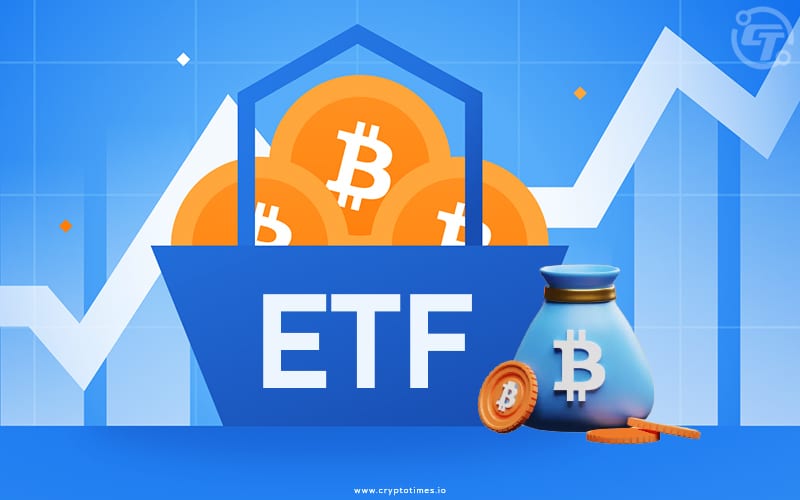Bitcoin exchange-traded funds (ETFs) have been the subject of much debate recently. Supporters argue that bitcoin ETFs would make it easier for investors to get into the Bitcoin market. They believe that more institutional investors would invest in Bitcoin if it were available through ETFs, which could lead to increased liquidity and price stability. Additionally, ETFs could help legitimize Bitcoin as an investment asset, which could lead to even more people investing in it.
The debate over bitcoin ETFs is likely to continue for some time, as opponents continue to see bitcoin as a volatile asset that is unregulated and a potential risk to their investment portfolios.
This article aims to shed light upon Bitcoin ETFs, explaining what they are, how they work, and why their approval has the potential to impact the price of Bitcoin. By delving into the mechanics and implications of Bitcoin ETFs, investors can better understand the opportunities and considerations associated with this investment avenue.
What is a Bitcoin ETF?
A Bitcoin ETF is an exchange-traded fund that tracks the price of Bitcoin. ETFs are traded on traditional exchanges, such as the New York Stock Exchange, just like stocks. Bitcoin ETFs offer investors a way to gain exposure to Bitcoin without having to directly own the cryptocurrency.
How do Bitcoin ETFs Work?
Bitcoin ETFs work in a similar way like other ETFs. An ETF is a type of investment fund that tracks the price of an underlying asset or index. In the case of a Bitcoin ETF, the underlying asset is Bitcoin.
There are two main types of Bitcoin ETFs:
- Spot ETFs invest in actual Bitcoin. This means that investors who buy shares in a spot ETF are actually buying a small piece of Bitcoin. Spot ETFs are considered to be more secure than futures-based ETFs, but they can also be more expensive.
- Futures-based ETFs invest in Bitcoin futures contracts. These contracts are agreements to buy or sell Bitcoin at a specified price on a future date. Futures-based ETFs can provide exposure to Bitcoin without the need of actually owning Bitcoin. However, they can also be more volatile than ETFs that own Bitcoin directly.
Understanding how the spot Bitcoin ETF works
Bitcoin ETF’s offer investors shares which have Bitcoin as an underlying asset. The ETF’s manager is responsible for investing the ETF’s assets in Bitcoin. The ETF holds the Bitcoin in a secure location and tracks the price of Bitcoin. When you sell your shares in the ETF, you are selling your ownership of the ETF, not your ownership of Bitcoin.
If you still have doubts about how Bitcoin ETFs work let us look at it this way.
When you invest in a Bitcoin ETF, you are not actually buying Bitcoin. Instead, you are buying shares in the ETF. The ETF then uses the money it raises from investors to buy Bitcoin. The ETF then holds the Bitcoin in a secure location and tracks the price of Bitcoin. This means that the value of your ETF shares will go up and down depending on the price of Bitcoin.
However, when you sell your shares in the ETF, you are not actually selling your Bitcoin. You are selling your ownership in the ETF. This means that you are selling your right to a share of the Bitcoin that the ETF holds. The buyer of your shares will then own a share of the Bitcoin that the ETF holds.
In other words, when you invest in a Bitcoin ETF, you are not actually buying Bitcoin. You are buying a piece of a fund that owns Bitcoin. This means that you do not have direct ownership of the Bitcoin, and you cannot transfer it to another wallet or use it to make purchases. However, you can still benefit from the price appreciation of Bitcoin by owning shares in the ETF.
Now that you have got the gist on how Bitcoin ETFs works, let us take a look at the complete process to know how to invest in Bitcoin ETFs
- The sponsoring company, usually an asset manager, establishes the ETF and buys the underlying asset, bitcoin in this case.
- Next, the Bitcoin ETF enters into contracts with large broker-dealers who act as authorized dealers for the fund.
- The authorized dealers then purchase large blocks of shares directly from the Bitcoin ETF and subsequently sell them to institutional and retail investors on a public stock exchange.
- The shares of ETFs are traded freely by investors within a price range that approximates bitcoins value tracked by the fund.
- It is important to note that if the dealers’ inventories of ETF shares grow too large, they can redeem shares with the ETF, which will then trigger a sale.
For US investors Sec is yet to approve a spot Bitcoin ETF, but it has approved bitcoin-linked ETFs such as BITO by ProShares.
Now let’s take a look at Bitcoin Futures ETF,
Understanding How Bitcoin Futures ETFs work?
In this, when you invest in a Bitcoin Futures ETF, you agree to buy or sell BTC at a given price on a specific date, regardless of the market condition of that time. The contract settlement date or expiration date is mutually agreed upon by you with the opposite party, satisfying both of your obligations.
The one who agrees to buy BTC contracts at the expiry would have to buy it either at a discount or with a premium.
The futures market is termed to be “premium” , whenever the price of btc is trading higher in the future than the spot. On the other hand it is termed as “discount”, when the spot price is higher than the futures price. In the commodities derivatives market discount is referred as Backwardation.
Let’s check how you can invest in the Bitcoin Futures ETF
- The ETF sponsor will create a subsidiary that will act as a commodity pool, which will purchase bitcoin futures contracts on an exchange.
- The ETF will issue shares to investors, which will represent a proportional ownership stake in the commodity pool.
- The price of the ETF shares will fluctuate based on the price of the bitcoin futures contracts held by the commodity pool.
- Investors can buy or sell these ETF shares, without actually buying or selling bitcoin.
- The ETF rebalances its holdings of bitcoin futures contracts on a regular basis, to ensure that the ETF continues to track the price of bitcoin accurately.
Hypothetically investors also have a chance to take profits from arbitrage, if the spread between the ETF and BTC becomes too broad, though the price of the ETF generally maintains a high correlation with the actual value.
Limitation of the Bitcoin Futures ETF
The most concerning problem with Bitcoin futures ETFs is the lack of accuracy in its ability to track price in real time. When the price of Bitcoin futures is greater than the spot price, it is a negative indicator for investors in Bitcoin futures and known as ‘ contango’. Its emergence implies that the ETF failed to track the price of BTC correctly. However, such a situation where the price of futures is lower than that of bitcoins current price leads to “ backwardation”.
In case the new contract’s price is somehow higher than the Bitcoin futures contract’s price, the funds from selling contracts that are about to expire will not be enough to buy the same number of contracts that will expire at a later date. As a result ETF performance gets affected.
Pros and Cons of Bitcoin ETFs
Like any investment, Bitcoin ETFs have both pros and cons. Some of the pros of investing in Bitcoin ETFs include:
- Easy to buy and sell: Bitcoin ETFs are traded on major exchanges, just like stocks. This makes them easy to buy and sell, and they can be accessed by investors of all experience levels.
- Regulated: Bitcoin ETFs are regulated by the SEC, which means that they must meet certain standards of transparency and disclosure. This can give investors peace of mind knowing that their investments are being held to high standards.
- Diversification benefits: By investing in a Bitcoin ETF, investors can gain exposure to Bitcoin without having to put all of their eggs in one basket. This can help to reduce risk and improve portfolio performance.
Some of the cons of investing in Bitcoin ETFs include:
- Relatively new: Bitcoin ETFs are a relatively new investment product, and they have not been around for as long as other types of ETFs. This means that there is less historical data available to investors, and it can be more difficult to assess the risks and potential rewards of investing in Bitcoin ETFs.
- Volatile: Bitcoin is a volatile asset, and its price can fluctuate rapidly. This means that Bitcoin ETFs can be risky investments, and investors should carefully consider their risk tolerance before investing.
- Can carry high fees: Bitcoin ETFs can carry high fees, which can eat into investor returns. As an investor you should carefully compare the fees of different Bitcoin ETFs before investing.
The Future of Bitcoin ETFs:
The SEC has not yet approved any Bitcoin ETFs in the United States, but the recent surge in interest and the filing by BlackRock could indicate that the agency is becoming more receptive to the idea.
The recent filing by BlackRock, the world’s largest asset manager, for a physically backed Bitcoin ETF has also added to the momentum in the Bitcoin market. BlackRock’s filing is seen as a sign that the SEC is becoming more receptive to Bitcoin ETFs, and it is possible that the agency could approve BlackRock’s filing in the near future.
“The SEC is considering whether to approve a Bitcoin ETF.” ~ Gary Genslar
If the SEC starts to approve Bitcoin ETFs in the future, it would make it easier for investors to gain exposure to Bitcoin and could help to legitimize the cryptocurrency industry. Bitcoin ETFs will become a more popular investment vehicle for both individual and institutional investors.
In addition to BlackRock, several other major financial institutions have filed for Bitcoin ETFs in recent months. These include:
- Invesco: Invesco filed for a physically backed Bitcoin ETF on June 20, 2023.
- WisdomTree: WisdomTree filed for a physically backed Bitcoin ETF on June 21, 2023.
- Bitwise: Bitwise filed for a physically backed Bitcoin ETF on June 22, 2023.
- Grayscale: Grayscale, the world’s largest digital asset manager, filed to convert its Grayscale Bitcoin Trust Pro(GBTC) into a spot ETF on June 28, 2023.
The filing of these ETFs by major financial institutions was considered as a sign that the SEC is becoming more receptive to the idea of Bitcoin ETFs. However, the SEC is still dissatisfied with current fillings and continues to scrutinize the current bitcoin ETF applications. Although, it is possible that the SEC could approve one or more of these ETFs in the near future, which would be a major milestone for the cryptocurrency industry.
Additionally, a number of companies have begun offering Bitcoin ETF-backed products, such as derivatives and structured products.
Here are the Current Top 5 Bitcoin Futures ETFs:
| ETF (ticker) | Investing strategy | AUM | ER |
| ProShares Bitcoin Strategy ETF (BITO) | Bitcoin Futures | $997M | 0.95 |
| ProShares Short Bitcoin ETF (BITI) | Decline in Bitcoin Futures | $139M | 0.95 |
| VanEck Bitcoin Strategy ETF (XBTF) | Bitcoin Futures | $44M | 0.76 |
| Valkyrie Bitcoin Strategy ETF (BTF) | Bitcoin Futures | $31M | 0.95 |
| Simplify Bitcoin Strategy PLUS Inc ETF (MAXI) | Bitcoin Futures | $24M | 0.97 |
The growing interest in Bitcoin ETFs is a sign that the cryptocurrency industry is maturing and becoming more mainstream. It is possible that Bitcoin ETFs could play a significant role in the future of cryptocurrency investing.
Why Bitcoin ETF Approvals Can Potentially Increase BTC Price
The approval of Bitcoin exchange-traded funds (ETFs) can potentially have a positive impact on the price of Bitcoin for several reasons:
- Increased Accessibility: Approval of Bitcoin ETFs allows a broader range of investors to participate in Bitcoin trading, increasing accessibility to the asset.
- Mainstream Acceptance: ETF approvals signal mainstream acceptance of Bitcoin as a legitimate asset class, boosting its credibility and attracting more investors.
- Increased Demand: Institutional investors and retail traders gaining access to Bitcoin through ETFs can lead to increased demand for the cryptocurrency.
- Improved Market Liquidity: ETFs facilitate the creation and redemption of shares in exchange for underlying Bitcoin, enhancing market liquidity and enabling smoother trading.
- Investor Confidence: Regulatory approval of Bitcoin ETFs enhances investor confidence and credibility in the cryptocurrency market, attracting more cautious investors.
- Regulated and Transparent: ETFs provide a regulated and transparent investment vehicle, appealing to investors concerned about the risks associated with unregulated cryptocurrency exchanges.
It’s important to note that the impact of ETF approvals on Bitcoin’s price is not guaranteed and can vary depending on market factors, investor sentiment, and overall market conditions.
Short-term price volatility and fluctuations can occur due to speculative trading and other market dynamics.
Conclusion:
Bitcoin ETFs are a relatively new investment product, but they are becoming increasingly popular. There are several benefits to investing in Bitcoin ETFs, including ease of use, regulation, and diversification. The SEC is likely to approve more Bitcoin ETFs in the future, which could help to legitimize the cryptocurrency industry and make it easier for investors to gain exposure to Bitcoin.
Overall, Bitcoin ETFs offer a number of potential benefits to investors, but they also come with some risks. Investors should carefully consider their individual circumstances before deciding whether or not to invest in Bitcoin ETFs.







